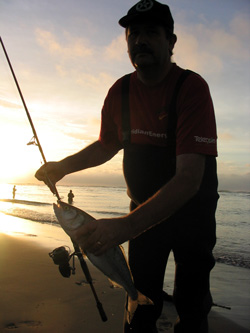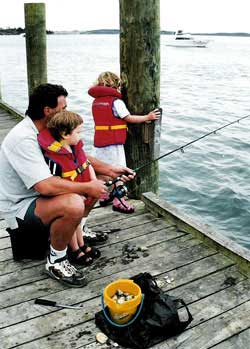|

|  |
 |
A
big climax expected to kahawai proceedings
Kahawai Challenge team
December
2008
|
Kahawai
Legal Challenge Update New Zealand Fishing News
January
2009 edition |
|
| |
|
|
| |
| The
Kahawai Legal Challenge team are celebrating the lodging
of legal submissions in advance of the Supreme Court hearing,
scheduled for February 12th 2009.
A judgment from our highest Court will have a bearing on
all future fisheries management decisions.
This landmark case was initiated by the New Zealand Big
Game and Recreational Fishing Councils in September 2005
and has been strongly supported by option4, Ngapuhi, Ngati
Whatua and thousands of Kiwis nationwide.
|
| |
More
than "just about kahawai"
If you thought
this case was “just about kahawai”, then think
again.
While seeking a rebuild of the kahawai fishery, the ultimate
objective is to obtain Court rulings on how the Minister
of Fisheries ‘allows for’ recreational fishing
interests, as required by section 21 of the Fisheries
Act, and what principles are to be applied when managing
fisheries of importance to non-commercial fishers.
A more conservative approach to managing snapper, tarakihi,
blue cod, kingfish, crayfish, paua and scallops will enable
customary, traditional and recreational fishers to provide
for their social, economic and cultural wellbeing.
Kahawai were
once easily accessible to land-based or small-boat fishermen.
Unconstrained
commercial purse seining in the early 1990s depleted kahawai
stocks that have never fully recovered.
|

Kahawai
- dawn at the river mouth
(Pic
courtesy of Peter Langlands Photography)
|
| |
 |
Effects
of depletion
Depletion
has meant a lack of fish in traditional fishing spots, reduced
catch rates and smaller fish, with immeasurable consequences
on both the marine ecosystem and people who fish for food.
Then the fisheries Ministry apply a “catch history”
policy to divide the available fish stocks between the fishing
sectors.
The
Supreme Court appeal challenges this catch history approach.
The Ministry’s catch history approach means that recreational
fishers get the leftovers, after the commercials have depleted
fish stocks.
In
most fisheries it would be blind chance if catch history
was a reasonable proxy for the wellbeing of recreational
fishers.
The
different interests involved – commercial interests,
largely recognised by gross tonnage and economic return
from exporting kahawai as pet food
|
and bait
versus recreational, largely the New Zealand way of life,
valuing kahawai for a variety of reasons, including consuming
as food – and the different resources – commercial
with aerial spotters, seine nets, and a trawler fleet versus
tinnies, fishing rods and limited time in the weekends –
make it an unequal contest if catch history is the touchstone. |
| |
How
can you help prepare for the hearing?
An
extraordinary amount of time, money and effort has gone
into preparing the Supreme Court appeal.
The
ultimate outcome will (hopefully) be the proper application
of our fisheries laws to achieve sustainable utilisation
of our fisheries for future generations, a healthy marine
environment and sufficient abundance to enable people
to provide for their social, economic and cultural wellbeing.
|
| |
If
you value your fishing, how about giving a special gift this Christmas?
Please
make a contribution of support:
-
-
Dial 0900 KAHAWAI (0900 52 42 92) to automatically donate $20
via your phone account
-
Contact Trish Rea on 0800 KAHAWAI (0800 52 42 92) for larger
amounts.
-
Cheques
to the ‘Kahawai Challenge Fund’ can be sent to New
Zealand Fishing News, PO Box 12-965, Penrose, Auckland.
|
|



